It hadn't rained through the night, and it was a fair morning, so I arranged to go down to Blazing Paddles for a trip on the Whanganui River. I arrived shortly after nine, and was asked by Judith, "You done this sort of thing before?" "The last time was about six years ago," I replied. I was then given the brief instructions, "Just steer for the Vs, avoid the rocks and trees. Here is a map, we'll pick you up at Ohinepane around 2pm. Make sure you don't overshoot it, there are a nasty set of rapids after that point. Assume you are going to get completely soaked, so make sure you are not wearing your best." I changed, left my key at Judith's office, and was asked to drive a station waggon with my kayak, "Just follow us!", and off I went.
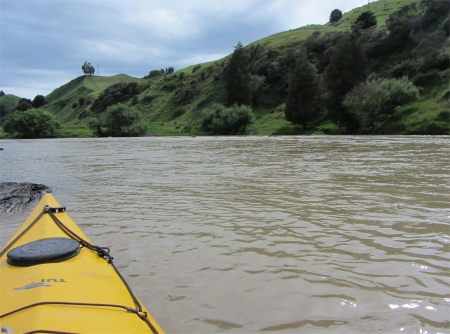 Gentle Hills by the Whanganui |
Ko au te awa, ko te awa ko au
I am the river and the river is me
These words embody the spiritual, cultural and historical relationship of Whanganui Maori with the river which holds their ancestry. This important whakatauki or saying traditionally used by local Maori has become increasingly relevant to locals of European descent whose lives and history have also become interwoven by the river as it travels on its journey to the sea.
New Zealand's longest navigable waterway begins high up in the volcanic plateau of the central North Island, an area of rugged, mountainous country west and south-west of Lake Taupo, and it drains the western slopes of Mounts Ngauruhoe, Tongariro, and Ruapehu. The river then travels north towards Taumarunui before heading south for 260km towards Wanganui. Its 329km journey to the sea passes through an endless procession of forested valleys and hills, the greater part of its length being deeply entrenched in a steep-walled gorge cut in soft, upper Tertiary sandstones and mudstones of the Whanganui National Park.
The upper reaches of the river are cloaked in dense rainforest and lead to the deeply incised gorges of the middle reaches. Tree ferns and rare native plants cling to the steep riverbanks and morning mist clings to the surface of the water from dawn, rising slowly with the light of day. This dramatic landscape opens out in the lower reaches of the river to follow rolling farmland and open valleys to the coastal dunes and cliffs which border the Tasman Sea to the west.
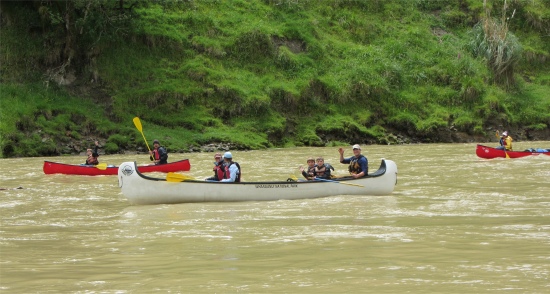 Members of the Large Group on the River |
After an hour I was tailing the large group around a tight bend with a set of rapids that had to be negotiated, trying to avoid a bar of shingle and rocks just to my right. Then I saw the tree lying across part of the rapids, half submerged. I tried to swerve around to avoid it, but the current was particularly strong here and the nose of the kayak clipped a bough on the tree. My craft immediately spun round, and then the full force of the current was hitting me sideways on. There is only one conclusion to that sort of situation, the kayak got turned over immediately and disappeared under the tree. I grabbed the bough and clung for dear life, but the onslaught of water was ebbing my strength away. I was having difficulty breathing too since water was shooting straight over me. I couldn't hang on and hold my breath for ever, so I made the only decision I could, let go and hope I'd come out at the other end. I was swept straight under the water and under the tree. I could feel I was getting knocked and pummelled, I felt a large clout on my mouth, and lost all sense of direction. Then I popped up, hurtling along at speed. A voice screamed, "Swim!" It was one of the guides from the large group. He had spotted my dilemma and was sprinting along the narrow strip of shore at this point, frantically getting a rope out of a bag to chuck to me. He succeeded, and tossed the loose end. I made a grab and praised the heavens when my fingers wrapped around it. He pulled me in like a fish, and I sat there panting on the shingle, totally exhausted; it took a couple of minutes for me to rise to my feet. The two guides then went off to recover my kayak and paddle. On their return, I thanked them profusely. My pride had been hurt, but I lived to tell the tale. The elder guide then spoke his mind, "Tell the outfit that you're with that they have no right to send a person down the river on their own when it is this high. There should be at least one guide with them. You make sure you tell them that! And also tell them to come and get rid of that tree. Now you tell them that, because I will call them tonight and let them know. Now you make sure you tell them, OK?" "Yes, I will tell them," was all I could muster. He was not a happy bunny. His group were all waiting on the opposite side of the river, and here was their guide rescuing a stranger. I felt one centimetre tall, and my pride was hurt, but hey, this happens.
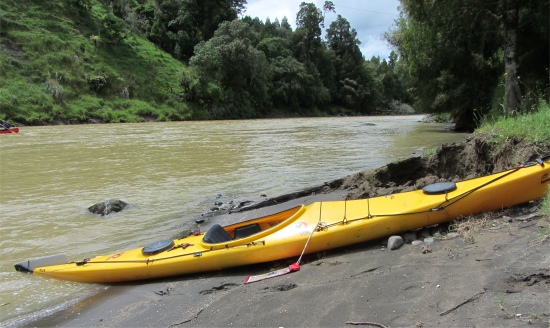 Break Time on the Whanganui |
I got over this wee incident a lot quicker than the previous one, and soon returned to the churning waters and headed downstream for more punishment. I pulled into the shore half an hour later and tucked into some more calories. Three fit guys in kayaks shot by shouting out "Kia Ora!" (Welcome) and were soon out of sight. I watched the large group pass by, and then I was on my own. By now I was starting to learn a thing or two, and was not as nervous as I shot each set of rapids.
The rest of my journey passed without further incident, and I paddled up to a concrete slipway at Ohinepane. I dragged my kayak out of the water, and took off some of my soaking gear and sat on the slipway. I had no idea what time it was, but since there was nobody there waiting to pick me up, I knew it must be before 2pm.
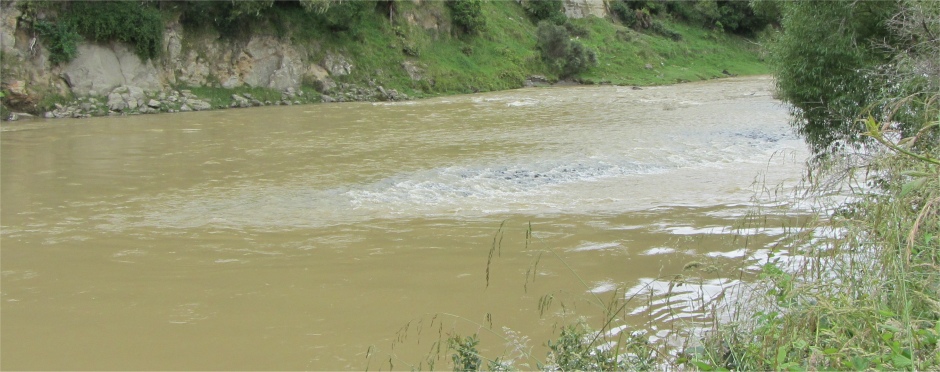 Start of Another Set of Rapids which Stretched Away into the Distance |
Then Judith turned up. I said farewell to the family, and helped to load my kayak and gear onto the station wagon, and we set off to drive the 30km back to her base. The guide had already spoken to her by phone. "Don't worry," she said, "he occasionally throws a stroppy one. The bloke reckoned that if the water hadn't been so high today, you would have cleared the tree. Mark and the boys will tackle the tree with a couple of chainsaws, and then all will be fine."
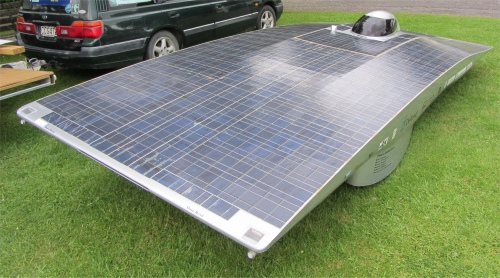 Solar Fern |
I thanked her for the day, though I did want to have another go at, "What the hell were you doing sending me out on the river on my own, when it is so high? You could have been bringing a body back." Overall, I had enjoyed my trip down the river, warts and all, and if it had been too easy, it would not have been so memorable. I just wanted to get back to camp and have a hot shower.
I must have spent half an hour in the shower, the showers here are good. I walked in with all I was wearing, and peeled it off under the hot cascading water, then soaked and cleaned myself up. I had two nasty looking toes, but nothing broken I think. My top lip was horribly blown up and distorted, I had a cut inside my mouth, and a few minor bumps and bruises, but I survived the day.
I chilled out doing my laundry then, back to normal I guess. Helene popped in to see me later to find out how I had got on. She was a little disappointed that I had experienced a rough ride, but I tried to reassure her that all turned out well and it would be much more memorable than a straight forward paddle. It was very kind of her to check up on me though; being an ex-district nurse, she offered me pain killers and the likes, but I was fine.
A novel form of transport arrived in the campsite for the evening, a three-wheeler named Solar Fern. Unlike Del Boy's, this was streamlined and was powered by $1,200 worth of solar panels. I gleaned from the young fellow standing next to it that the panels generate around 800W, and on a good day with plenty of cloud down reflection, 1KW was achievable. That would enable a top speed of 150 Km/hr. He had a backup team with him on his mission: to drive from Bluff to Cape Reinga, the equivalent to Britain's Land's End to John O'Groats, in 10 days. Sadly the recent spate of bad weather had put paid to that. It was good to see a plug for renewable energy though.
